ARRESTS.ORG TN – SEARCH TENNESSEE ARREST RECORDS
Arrests.org TN is a public information resource that helps users explore Tennessee arrest records sourced from various law enforcement agencies. The platform provides a user-friendly search experience, enabling individuals to easily determine if someone has been arrested in the state. Arrests.org TN is intended for personal use only, such as reconnecting with someone or satisfying general curiosity. It is not intended for any commercial or employment-related purpose.
Arrests.org TN offers a straightforward user experience. The website’s search lets users input specific criteria, like names or locations. This makes it easy to get accurate and relevant arrest records. This feature can be helpful for individuals conducting personal research or seeking general public information. It allows users to see if public arrest records are available based on name or location. The platform ensures that accessing Tennessee’s arrest records is both reliable and convenient. You can find them in one place.
[wpcode id=”971″]Click here to search this form https://tennessee.staterecords.org/arrests
Public Records in Tennessee
Public records in Tennessee include many documents and data. Government agencies maintain them. They include arrest and criminal records. The public can usually access these records under the Tennessee Public Records Act. The act ensures transparency and accountability in the state’s legal and government systems. This access lets citizens get information about people’s encounters with police. It also lets them get their criminal history.It helps with general personal research and understanding someone’s public record. Certain sensitive records, such as those involving juveniles or ongoing investigations, may be restricted to protect privacy and legal rights.
Are Arrest and Criminal Records Public in Tennessee?
In Tennessee, arrest records and criminal documents are generally considered public records. This means the public can access these records. But, there may be restrictions. For instance, records about juveniles or those under investigation might be restricted. This is to protect privacy and the integrity of ongoing investigations. The principle supports public access. But, specifics ensure a balance. They balance transparency and individual rights.
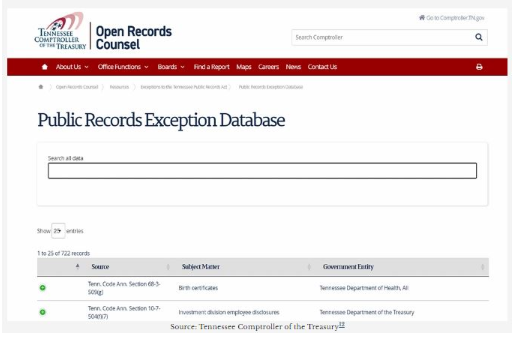
Recent Detentions in Tennessee
Recent detentions in Tennessee are a complex topic. Understanding them involves law. It also involves the specific events that led to a person’s confinement. “Detention” means the legal apprehension and confinement of an individual. It happens when they are suspected of crimes. Understanding why someone is in jail requires navigating legal proceedings. You need to understand the charges and the broader context of the state’s justice system. This task is about unraveling legal terms and procedures. These will give insights into why an individual is confined.
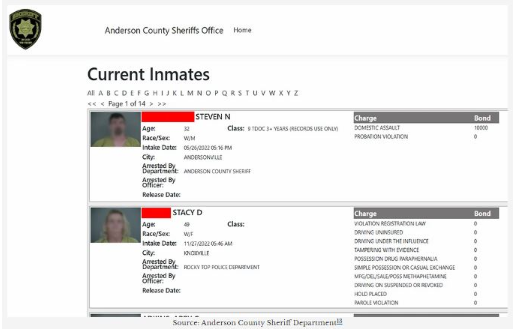
How to Locate Tennessee Booking Photos and Verify Arrests
To find arrest records in Tennessee’s counties, you must understand their decentralized police records. Each county has its arrest records, making a systematic approach essential to gather all the information. The process includes accessing county-level databases, contacting local law enforcement agencies, or utilizing tools available throughlike Arrests.org provide access to publicly available arrest information and booking photos compiled from various counties in Tennessee. These tools can help individuals look up publicly sourced arrest data, but accuracy depends on official reporting and may vary by jurisdiction. Always cross-reference names and dates carefully, as not all counties report the same way.
Booking photos, or mugshots, are integral components of arrest records. They can access county databases or online platforms. Cross-referencing details, like names and dates of birth, against records ensures accuracy. It confirms if an individual has been apprehended.
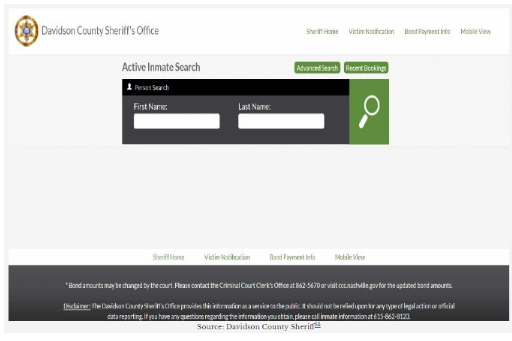
Verifying Recent Detentions in City Jails Across Tennessee
Checking recent jailings in Tennessee city jails involves navigating local databases, as each city may maintain separate jail records. Access often requires contacting city police departments, submitting public record requests, or using city-managed online lookup tools where available.
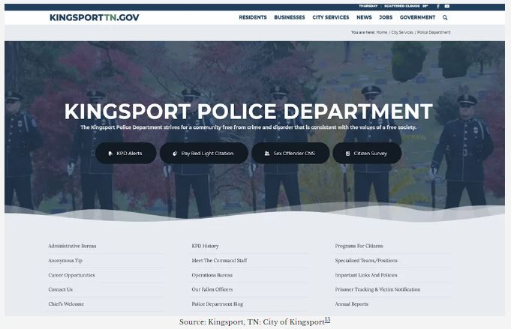
Acquiring Copies of Criminal Records in Tennessee
To get copies of criminal records in Tennessee, people start by finding the right authorities. The Tennessee Bureau of Investigation (TBI) offers a public records platform called TORIS for accessing criminal record searches. Individuals may submit a request using identifying information such as full name and date of birth. Depending on the request type, a fee may apply. For the most accurate and official records, mail or fax requests may also be submitted directly to the TBI.
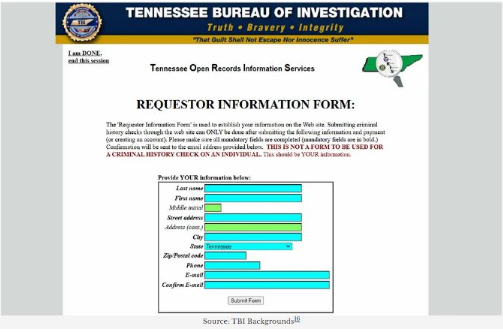
Determining Probation Status in Tennessee
Contact the probation office or court where the case was decided. Ask if someone is on probation in Tennessee. Giving key details helps. These include the person’s name and date of birth. To check if someone is on probation in Tennessee, you may contact the appropriate county probation office or court clerk. They may provide limited public information if permitted by law. Be aware that not all probation-related details are public, and availability varies by jurisdiction.
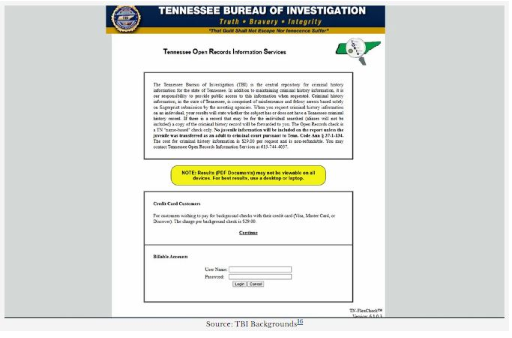
Sealing or Expunging a Criminal Record in Tennessee
Sealing or expunging a criminal record in Tennessee involves a legal procedure. Eligible individuals can use it to restrict access to their records or have them erased. The eligibility criteria depend on the nature of the offense and other conditions. People must get their criminal records. Then, they must file a petition for expungement or sealing in the right court. They must also obey any waiting periods. If approved, the records will be sealed or expunged. This will give individuals a fresh start.
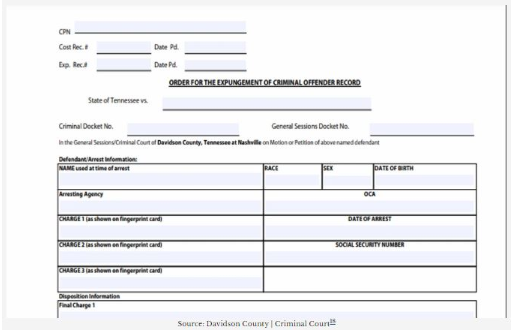
Verifying Incarceration in Tennessee
To see if someone is incarcerated in a Tennessee state or federal prison, individuals can use public inmate search tools provided by the Tennessee Department of Corrections (TDOC) or the Federal Bureau of Prisons (BOP). These tools allow users to look up publicly available incarceration information by entering a name or ID number.
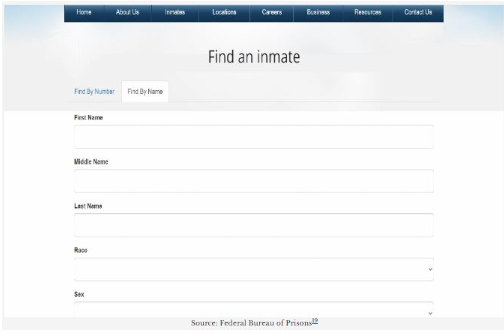
Performing an Ongoing Arrest Warrant Search in Tennessee
Searching for active arrest warrants in Tennessee involves using publicly available tools or contacting local law enforcement and court offices. Keep in mind that not all warrant information is available online, and requests must comply with public records laws.
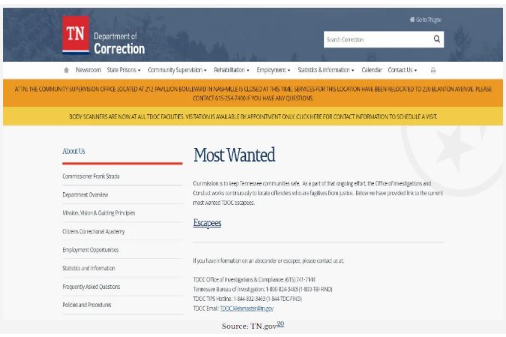
Utilizing the Tennessee Sex Offender Registry
The Tennessee Sex Offender Registry is vital. It helps identify sexual offenders nearby. The Tennessee Bureau of Investigation maintains the registry. It allows users to search for offenders by location, name, or address. By responsibly using this information, residents can enhance community safety and awareness.
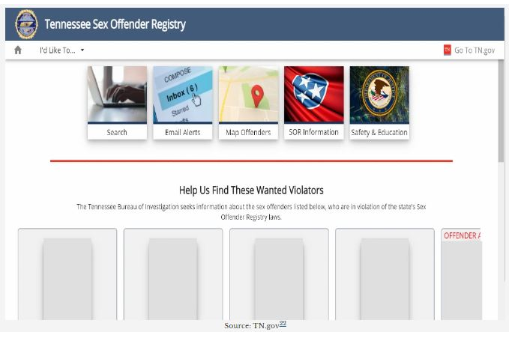
Legal Guidelines on Arrest and Criminal Records in Tennessee
Tennessee’s laws ensure a balance. They balance public access to arrest and criminal records with privacy. While most records are accessible, exemptions exist for sensitive information. The Tennessee Public Records Act sets the rules for public disclosure. It emphasizes transparency while protecting sensitive data.
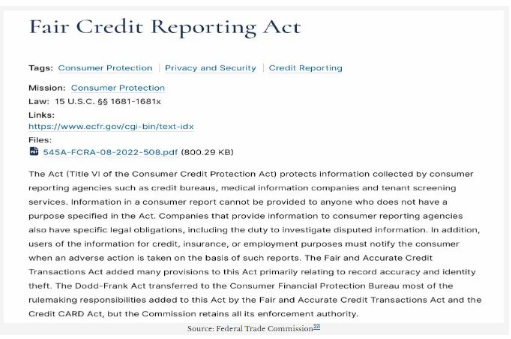
Insights from Tennessee Arrest Statistics
The Tennessee Bureau of Investigation says that, in 2019, Tennessee had 334,804 arrests. In 2021, the state saw 297,177 arrests. DUI arrests and weapons law violations rose a lot. These statistics provide a comprehensive view of crime trends and enforcement in Tennessee.
Arrest Records in Tennessee
An arrest record has detailed info about a person’s detention. It includes the charges filed, court appearances, and more. The public can generally access these records. But, some exemptions exist under the Freedom of Information Act or court orders.
Correcting Errors and Expunging Records
To correct or expunge a criminal record in Tennessee, individuals must submit a request to the Tennessee Bureau of Investigation. This process typically requires fingerprints for verification. If eligible, individuals may petition the court for expungement. If approved, the records may be sealed or expunged from public access, depending on the type of offense.
Using Third-Party Services
Some third-party websites provide access to public arrest records. However, these services may not have comprehensive coverage, and information may vary by jurisdiction. Use caution when interpreting results, and verify with official sources when necessary.
By understanding these processes and using resources, people can navigate Tennessee’s legal and law enforcement systems. They can access arrest and criminal records. They can verify detentions and get accurate, relevant information.
Frequently Asked Questions (FAQs)
Can anyone access my arrest records in Tennessee?
Generally, arrest records in Tennessee are considered public information, meaning that they are accessible to the public. However, there are certain restrictions in place. For instance, juvenile arrests and investigative records may have limited accessibility to protect the privacy and well-being of individuals involved. The intent is to balance the public’s right to information with the need to safeguard sensitive details, especially in cases involving minors or ongoing investigations.
How do I request access to arrest records in Tennessee?
Tennessee residents interested in accessing arrest records can do so by submitting a written request to the relevant law enforcement agency. The written request typically includes the requester’s identification information and the specific details of the records being sought. It’s important to note that Out-of-state requesters should contact the relevant agency directly, as access may depend on jurisdictional rules. This restriction ensures that the release of information aligns with state regulations and jurisdictional boundaries.
What information is required for a Tennessee arrest record search?
Initiating a Tennessee arrest record search can be done by contacting the arresting agency directly or by using the Tennessee Bureau of Investigation’s (TBI) online search tool. In either case, basic information about the individual in question is necessary. Basic info like name and location is typically required. Including a date of birth can help narrow results. Do not include private identifiers unless officially requested; if known, it can help narrow down the search and ensure more accurate results.
Can I expunge my arrest record if the charges were dropped?
Yes, individuals in Tennessee have the opportunity to expunge their arrest records if the charges against them were dropped. Expungement is a legal process that involves filing a petition with the court where the case originated. The individual seeking expungement must demonstrate that the charges were dropped, and the court will then review the case. If approved, the arrest record is effectively erased, providing the individual with a clean slate. This process acknowledges that individuals should not carry the burden of an arrest on their record if the charges were ultimately dismissed.
Are arrest records automatically expunged in Tennessee after a certain period?
No, arrest records in Tennessee do not undergo automatic expungement after a specific period. Instead, they remain on file indefinitely unless the individual takes proactive steps to seek expungement through the legal process. This places the responsibility on the individual to initiate the expungement procedure, ensuring that their record reflects the accurate outcome of the case. Automatic expungement is not a feature of the system, emphasizing the importance of individual agencies in managing their arrest records.
